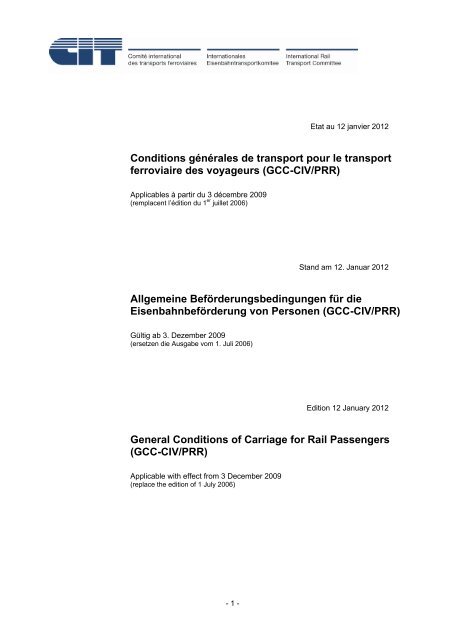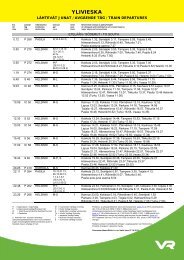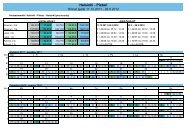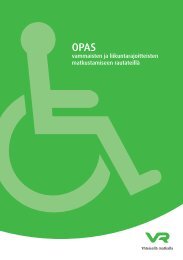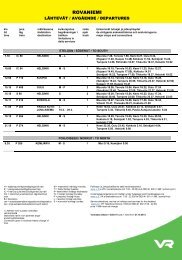GCC-CIV/PRR - VR
GCC-CIV/PRR - VR
GCC-CIV/PRR - VR
- No tags were found...
Create successful ePaper yourself
Turn your PDF publications into a flip-book with our unique Google optimized e-Paper software.
Etat au 12 janvier 2012Conditions générales de transport pour le transportferroviaire des voyageurs (<strong>GCC</strong>-<strong>CIV</strong>/<strong>PRR</strong>)Applicables à partir du 3 décembre 2009(remplacent l’édition du 1 er juillet 2006)Stand am 12. Januar 2012Allgemeine Beförderungsbedingungen für dieEisenbahnbeförderung von Personen (<strong>GCC</strong>-<strong>CIV</strong>/<strong>PRR</strong>)Gültig ab 3. Dezember 2009(ersetzen die Ausgabe vom 1. Juli 2006)Edition 12 January 2012General Conditions of Carriage for Rail Passengers(<strong>GCC</strong>-<strong>CIV</strong>/<strong>PRR</strong>)Applicable with effect from 3 December 2009(replace the edition of 1 July 2006)- 1 -
<strong>GCC</strong>-<strong>CIV</strong>/<strong>PRR</strong> 2012-01-01Document accessible au publicÖffentlich zugängliches DokumentThis document may be shared with the publicSelon le point 2.5 a) des Statuts du CIT, le présent document a qualité de recommandation et ne lie les membresdu CIT que si ceux-ci l’ont adopté (principe de l’opting in).Gemäss Punkt 2.5 a) der CIT-Statuten hat das vorliegende Dokument empfehlenden Charakter und bindet dieCIT-Mitglieder insoweit, als sie diese Bestimmungen übernehmen (Opting-in-Prinzip).In accordance with point 2.5 a) of the CIT Statutes, this document is a recommendation and only binds members tothe extent that members adopt it (opting-in principle).© 2009 Comité international des transports ferroviaires (CIT)Internationales Eisenbahntransportkomitee (CIT)International Rail Transport Committee (CIT)www.cit-rail.orgSupplément n°Nachtrag Nr.Amendment NoApplicable à partir duGültig abApplicable with effect from1 2009-12-032 2011-01-013 2012-01-01Corrigendum 2012-01-12- 2 -
2012-01-01 <strong>GCC</strong>-<strong>CIV</strong>/<strong>PRR</strong>Table des matières Inhaltsverzeichnis ContentsPréambule Präambel Preamble 51 Conditions générales etBeförderungsbedingungen Conditions of carriage 5particulières de transport2 Bases légales Rechtsgrundlagen Statutory basis 63 Contrat de transport Beförderungsvertrag Contract of carriage 64 Titre de transport et réservation Beförderungsausweise und Tickets and reservations 7Reservierungen4.1 Généralités Allgemeines In general 74.2 Achat Erwerb Purchase 85 Obligations du voyageur Pflichten des Reisenden Passengers’ obligations 95.1 Avant le départ Vor Reiseantritt Before the journey 95.2 Durant le voyage Während der Reise During the journey 106 Colis à main Handgepäck Hand luggage 117 Animaux Tiere Animals 128 Bagages et véhicules Reisegepäck und Fahrzeuge Registered luggage and vehicles 129 Retards Verspätungen Delays 129.1 Annulations et retards prévisibles Zugausfälle und erwarteteVerspätungenTrains cancellations and anticipateddelays9.2 Retards effectifs Erlittene Verspätungen Delays sustained 139.3 Traitement des remboursements etdes indemnisations9.4 Impossibilité de poursuivre levoyage le même jour9.5 Exonération de la responsabilité encas de retardBehandlung von Erstattungen undEntschädigungenUnmöglichkeit der Fortsetzung derReise am selben TagBefreiung von der Haftung fürVerspätungenHandling of refunds and compensationNon-continuation of the journey thesame day121314Relief from liability for delays 1410 Assistance en cas de retard Hilfeleistung bei Verspätungen Assistance in case of delays 1511 Dommages corporels Personenschäden Personal injury 1512 Dommages matériels Sachschaden Loss and damage to property 1613 Réclamations et plaintes Reklamationen und Beschwerden Claims and complaints 1713.1 Réclamations relatives auxdommages corporelsReklamationen betreffendPersonenschaden13.2 Autres réclamations et plaintes Andere Reklamationen undBeschwerdenClaims for personal injury 17Other claims and complaints 1714 Actions en justice Streitigkeiten Disputes 1814.1 Entreprises contre lesquelles l’actionen justice peut être engagéeUnternehmen, gegen die Ansprüchegerichtlich geltende gemacht werdenkönnenUndertakings against which anaction may be brought14.2 Extinction et prescription des actions Erlöschen und Verjährung von Extinction and limitation of actions 18Ansprüchen14.3 For Gerichtsstand Jurisdiction 1914.4 Droit applicable Anwendbares Recht Applicable law 1918- 3 -
2012-01-01 <strong>GCC</strong>-<strong>CIV</strong>/<strong>PRR</strong>Préambule Präambel PreambleLes Conditions générales de transportpour le transport ferroviaire des voyageurs(<strong>GCC</strong>-<strong>CIV</strong>/<strong>PRR</strong>) ont pour but degarantir l’application de conditionscontractuelles uniformes dans le transportnational et international des voyageurspar chemin de fer, pour autantque cela soit approprié et possible.Les <strong>GCC</strong>-<strong>CIV</strong>/<strong>PRR</strong> ont été élaboréesau sein du Comité international destransports ferroviaires (CIT), lequel enrecommande l’utilisation à ses membres.Leur contenu ainsi que la listedes entreprises qui les appliquentpeuvent être consultés sur le siteInternet du CIT www.cit-rail.org et surle site conjoint UIC/CIT/CERwww.railpassenger.info, ainsi que, enrègle générale, dans les points devente de ces entreprises offrant unconseil à la clientèle.Die Allgemeinen Beförderungsbedingungenfür die Eisenbahnbeförderungvon Personen (<strong>GCC</strong>-<strong>CIV</strong>/<strong>PRR</strong>) sollensicherstellen, dass im nationalen undinternationalen Schienenpersonenverkehrsoweit wie möglich und zweckmässigeinheitliche Vertragsbedingungenzur Anwendung gelangen.Die <strong>GCC</strong>-<strong>CIV</strong>/<strong>PRR</strong> wurden vom InternationalenEisenbahntransportkomitees(CIT) ausgearbeitet und sindseinen Mitgliedern zur Anwendungempfohlen. Ihr Inhalt sowie die Listeder anwendenden Unternehmen könnenin der CIT-Website www.citrail.orgund in der UIC/CIT/CER-Websitewww.railpassenger.info eingesehenwerden, ferner in der Regel beideren Verkaufsstellen mit kundendienstlicherBeratung.The purpose of the General Conditionsof Carriage for Rail Passengers (<strong>GCC</strong>-<strong>CIV</strong>/<strong>PRR</strong>) is to ensure that uniformcontractual conditions are applied tointernational and domestic passengertraffic by rail, insofar as this is feasibleand appropriate.The International Rail TransportCommittee (CIT) drew up these <strong>GCC</strong>-<strong>CIV</strong>/<strong>PRR</strong> and recommends that itsmembers apply them. The text of the<strong>GCC</strong>-<strong>CIV</strong>/<strong>PRR</strong> and the list of undertakingsapplying them are shown onthe CIT website www.cit-rail.org andon UIC/CIT/CER websitewww.railpassenger.info. As a generalrule, they may also be consulted at thesales points of those undertakingswhich provide customer advice.1 Conditions générales et particulièresde transport1.1 Les <strong>GCC</strong>-<strong>CIV</strong>/<strong>PRR</strong> établissent desrègles générales applicables dans lesrelations contractuelles entre le voyageuret le transporteur. Les règles quidérogent aux <strong>GCC</strong>-<strong>CIV</strong>/<strong>PRR</strong> (point 1.2ci-dessous) ou qui ne sont valablesque pour des liaisons, des catégoriesde trains ou des offres spécifiques fontl’objet de conditions particulières detransport.1.2 Les conditions particulières de transportpeuvent déroger aux <strong>GCC</strong>-<strong>CIV</strong>/<strong>PRR</strong>. Lorsqu’elles dérogent aux<strong>GCC</strong>-<strong>CIV</strong>/<strong>PRR</strong>, elles mentionnentexpressément le paragraphe et le pointdes <strong>GCC</strong>-<strong>CIV</strong>/<strong>PRR</strong> auxquels ellesdérogent. Seules des dérogations enfaveur du voyageur sont admises pourles points 9.1, 9.2, 9.3.1, 9.3.4, 9.4,9.5, 10, 11, 12, 13, 14 des <strong>GCC</strong>-<strong>CIV</strong>/<strong>PRR</strong>, à moins que le Règlementsur les droits des voyageurs (<strong>PRR</strong>) nesoit pas applicable (dans les Etats nonmembres de l’Union européenne (UE)ou sur certains services de transportdans l’UE exemptés du <strong>PRR</strong>).1.3 Les <strong>GCC</strong>-<strong>CIV</strong>/<strong>PRR</strong> ainsi que lesconditions particulières de transportdeviennent, par la conclusion ducontrat de transport, partie intégrantede ce dernier (point 3.2 ci-dessous).Beförderungsbedingungen Conditions of carriageDie <strong>GCC</strong>-<strong>CIV</strong>/<strong>PRR</strong> regeln allgemeineFragen des Vertragsverhältnisseszwischen Reisenden und Beförderer.Regelungen, die von diesen <strong>GCC</strong>-<strong>CIV</strong>/<strong>PRR</strong> (Pt. 1.2 nachstehend) abweichenoder nur für bestimmte Verkehrsverbindungen,Zugsgattungen oderTarifangebote gelten, sind in denbesonderen Beförderungsbedingungengeregelt.Die besonderen Beförderungsbedingungenkönnen von den <strong>GCC</strong>-<strong>CIV</strong>/<strong>PRR</strong> abweichen. Sofern sieabweichen, bezeichnen sie genau denPunkt und den Absatz, von dem sieabweichen. Von den Punkten 9.1, 9.2,9.3.1, 9.3.4, 9.4, 9.5, 10, 11, 12, 13, 14<strong>GCC</strong>-<strong>CIV</strong>/<strong>PRR</strong> kann nur zu Gunstendes Reisenden abgewichen werden,es sei denn, die Fahrgastrechteverordnung(<strong>PRR</strong>) ist nicht anwendbar(in Nicht-EU-Mitgliedstaaten oder aufVerkehrsleistungen, die von der <strong>PRR</strong>ausgenommen sind).Allgemeine wie besondere Beförderungsbedingungenwerden mitAbschluss des Beförderungsvertragesdessen Bestandteil (Pt. 3.2 nachstehend).The <strong>GCC</strong>-<strong>CIV</strong>/<strong>PRR</strong> cover generalissues concerning the contractualrelationship between passengers andcarriers. Conditions which derogatefrom the <strong>GCC</strong>-<strong>CIV</strong>/<strong>PRR</strong> (point 1.2below) or which only apply to particularroutes, particular types of trains orparticular offers are covered by thespecial conditions of carriage.The special conditions of carriage mayderogate from the <strong>GCC</strong>-<strong>CIV</strong>/<strong>PRR</strong>. Ifthe special conditions of carriage doderogate from the <strong>GCC</strong>-<strong>CIV</strong>/<strong>PRR</strong> theyare to mention the paragraph and thepoint of the <strong>GCC</strong>-<strong>CIV</strong>/<strong>PRR</strong> from whichthey derogate explicitly. Any derogationin the case of points 9.1, 9.2,9.3.1, 9.3.4, 9.4, 9.5, 10, 11, 12, 13, 14<strong>GCC</strong>-<strong>CIV</strong>/<strong>PRR</strong>, may only be in favourof the passenger, unless thePassengers’ Rights Regulation (<strong>PRR</strong>)is not applicable (in non MemberStates of the European Union (EU) oron exempted rail services within theEU).Both the <strong>GCC</strong>-<strong>CIV</strong>/<strong>PRR</strong> and thespecial conditions of carriage becomeintegral parts of the contract ofcarriage on its conclusion (point 3.2below).- 5 -
<strong>GCC</strong>-<strong>CIV</strong>/<strong>PRR</strong> 2012-01-012 Bases légales Rechtsgrundlagen Statutory basisLe transport des voyageurs par cheminde fer est régi par :a. les Règles uniformes concernantle Contrat de transport internationalferroviaire des voyageurs (<strong>CIV</strong>– Appendice A de la COTIF), et/oub. le Règlement (CE) n°1371/2007 duParlement européen et du Conseildu 23 octobre 2007 sur les droitset obligations des voyageurs ferroviaires(<strong>PRR</strong>), et/ouc. le droit national,dans la mesure où ils sont applicablesou s’il en a été convenu ainsi parcontrat.Die Eisenbahnbeförderung von Personenunterliegt nach Massgabe deranwendbaren Bestimmungen odervertraglichen Vereinbarungen:a. den Einheitlichen Rechtsvorschriftenfür den Vertrag über die internationaleEisenbahnbeförderungvon Personen (<strong>CIV</strong> – Anhang Azum COTIF) und/oderb. der Verordnung (EG) Nr.1371/2007 des EuropäischenParlaments und des Rates vom23. Oktober 2007 über die Rechteund Pflichten der Fahrgäste imEisenbahnverkehr (<strong>PRR</strong>) und/oderc. dem Landesrecht.The carriage of passengers by rail issubject to the provisions of:a. the Uniform Rules concerning theContract of International Carriageof Passengers by Rail (<strong>CIV</strong> –Appendix A to COTIF), and/orb. Regulation (EC) No 1371/2007 ofthe European Parliament and theCouncil of 23 October 2007 on railpassengers’ rights and obligations(<strong>PRR</strong>), and/orc. national law,in so far as they are applicable oragreed on a contractual basis.3 Contrat de transport Beförderungsvertrag Contract of carriage3.1 Par le contrat de transport, le(s) transporteur(s)participant à l’exécution ducontrat s’engage(nt) à transporter levoyageur du lieu de départ au lieu dedestination.3.2 Le contrat de transport se compose :a. des <strong>GCC</strong>-<strong>CIV</strong>/<strong>PRR</strong> ;b. des conditions particulières detransport du ou des transporteurs ;etc. des données figurant sur le titre detransport (point 4.1.3 ci-dessous).En cas de conflit entre les <strong>GCC</strong>-<strong>CIV</strong>/<strong>PRR</strong> et les conditions particulièresde transport, ces dernières l’emportent.En cas de contradiction entre desclauses des conditions particulières detransport, la réglementation la plusavantageuse pour le voyageurl’emporte.3.3 Le contrat de transport est constatépar le titre de transport traditionnelémis sous forme papier ou par lee-billet. Le titre de transport fait foi,jusqu’à preuve du contraire, de laconclusion et du contenu du contrat detransport.3.4 Un titre de transport matérialise uncontrat de transport, sauf dans les casmentionnés aux points 3.5 et 3.6 cidessous.Der Beförderungsvertrag verpflichtetden oder die an der Durchführung desBeförderungsvertrags beteiligtenBeförderer, den Reisenden vomAbgangs- bis zum Bestimmungsort zubefördern.Der Beförderungsvertrag setzt sichzusammen aus:a. den <strong>GCC</strong>-<strong>CIV</strong>/<strong>PRR</strong>,b. den besonderen Beförderungsbedingungendes oder der Beförderer,undc. den Angaben im Beförderungsausweis(Pt 4.1.3 nachstehend).Widersprechen sich die <strong>GCC</strong>-<strong>CIV</strong>/<strong>PRR</strong>und die besonderen Beförderungsbedingungen,haben Letztere Vorrangvor den <strong>GCC</strong>-<strong>CIV</strong>/<strong>PRR</strong>. Im Fall vonWidersprüchen zwischen Bestimmungender besonderen Beförderungsbedingungengilt die für den Reisendenvorteilhaftere Regelung.Der Beförderungsvertrag wird imBeförderungsausweis festgehalten,entweder in herkömmlicher Papierformoder als elektronischer Beförderungsausweis(im Folgenden „e-Beförderungsausweis“).Der Beförderungsausweisdient bis zum Beweis desGegenteils als Nachweis für denAbschluss und den Inhalt des Beförderungsvertrages.Vorbehaltlich der in Pt. 3.5 und 3.6genannten Fälle dokumentiert einBeförderungsausweis einen Beförderungsvertrag.The contract of carriage obliges thecarrier(s) taking part in the performanceof the contract of carriage tocarry the passenger from the place ofdeparture to the place of destination.Contracts of carriage consist of:a. the <strong>GCC</strong>-<strong>CIV</strong>/<strong>PRR</strong>;b. the carrier(s) special conditions ofcarriage; andc. the specific data indicated on theticket (point 4.1.3 below).In the event of conflict between the<strong>GCC</strong>-<strong>CIV</strong>/<strong>PRR</strong> and the special conditionsof carriage, the latter take precedenceover the former. In the event ofinconsistencies in the special conditionsof carriage, the condition morefavourable to the passenger is toapply.Contracts of carriage are confirmed bytickets, either in the form of traditionalpaper tickets or as e-tickets. Ticketsact as prima facie evidence of theconclusion and content of the contractof carriage.One ticket represents one contract ofcarriage except for the cases coveredin points 3.5 and 3.6 below.- 6 -
2012-01-01 <strong>GCC</strong>-<strong>CIV</strong>/<strong>PRR</strong>3.5 Plusieurs titres de transport traditionnelsémis sous forme papier matérialisentun contrat de transport unique,pour autant que cela soit indiquéclairement dans les conditions particulièresde transport, s’ils sont émissimultanément en un même lieu pourun même voyage et s’ils :a. sont placés ensemble dans unecouverture ou une pochette prévueà cet effet, oub. sont agrafés ensemble de façonpermanente, ouc. sont chaînés par un code alphanumérique,oud. n’indiquent qu’un seul prix pourtout le transport, oue. sont liés entre eux d’une autrefaçon, conformément aux conditionsparticulières de transport.Plusieurs e-billets matérialisent uncontrat de transport unique lorsqu’ilssont liés électroniquement.3.6 Un titre de transport unique peut aussimatérialiser plusieurs contrats detransport, pour autant que cela soitindiqué clairement dans les conditionsparticulières de transport.3.7 Le transfert entre deux gares, parexemple entre les gares d’une mêmeagglomération par un moyen de transportautre que le chemin de fer (bus,tram, métro, etc.), ou à pied, n’est pascouvert par le contrat de transport etest régi par le droit applicable au modede transport concerné.Soweit dies aus den besonderenBeförderungsbedingungen klar ersichtlichist, dokumentieren mehrere Beförderungsausweisein herkömmlicherPapierform einen einzigen Beförderungsvertrag,wenn sie zur selben Zeitund am selben Ort für die selbe Reiseausgestellt sind und sofern siea. in einem hierfür vorgesehenenUmschlag oder gegebenenfallsFahrscheintasche zusammengefügtsind, oderb. dauerhaft zusammengeheftet sind,oderc. alphanumerisch verkettet sind,oderd. nur einen Gesamtpreis angeben,odere. in anderer Weise gemässbesonderen Beförderungsbedingungenmiteinander verbundensind.Mehrere e-Beförderungsausweisedokumentieren einen einzigen Beförderungsvertragwenn sie elektronischverknüpft sind.Soweit aus den besonderen Beförderungsbedingungenklar ersichtlich,kann ein einziger Beförderungsausweisauch mehrere Beförderungsverträgedokumentieren.Der Transfer zwischen Bahnhöfen,z.B. im gleichen Ballungsraum mitanderen Verkehrsträgern als derEisenbahn (Bus, Tram, Metro etc.)oder zu Fuss, bilden nicht Gegenstanddes Beförderungsvertrages und erfolgenzu den für den betreffenden Verkehrsträgergeltenden Rechtsvorschriften.Provided it is clearly stated in thespecial conditions of carriage, severaltickets in the traditional paper formrepresent a single contract of carriageif they are issued at the same time andplace for the same journey and if theya. are placed together in a purposedesignedcover or ticket wallet, orb. are permanently stapled together,orc. are cross-referenced alphanumerically,ord. show only one total fare, ore. are linked together in another wayin accordance with the specialconditions of carriage.Several e-tickets represent a singlecontract of carriage if they are linkedelectronically.Provided it is clearly stated in thespecial conditions of carriage, a singleticket may represent several contractsof carriage.Transfer between railway stations, forexample in the same conurbation bytransport modes other than rail (bus,tram, metro, etc.), or on foot, does notform part of the contract of carriageand is performed in accordance withthe law applicable to the transportmode in question.4 Titre de transport et réservation Beförderungsausweise undReservierungen4.1 Généralités Allgemeines In general4.1.1 Les transporteurs ou leurs associationsdéterminent la forme et lecontenu des titres de transport ainsique les langues et les caractères danslesquels ils doivent être imprimés etremplis.4.1.2 Les e-billets sont régis par des conditionsparticulières de transport. Ilspeuvent être convertis en signesd’écriture lisibles.Die Beförderer oder ihre Verbändelegen Form und Inhalt der Beförderungsausweisesowie die beim Druckund Ausfüllen zu verwendenden Sprachenund Schriftzeichen fest.Für elektronische Beförderungsausweisegelten besondere Beförderungsbedingungen.Die Angaben im e-Beförderungsausweis sind in lesbareSchriftzeichen umwandelbar.Tickets and reservationsCarriers or their associations determinethe design of tickets and thelanguages and characters to be usedto print and fill them out.E-tickets are subject to special conditionsof carriage. The details containedin the e-ticket can be transformed intolegible written symbols.- 7 -
<strong>GCC</strong>-<strong>CIV</strong>/<strong>PRR</strong> 2012-01-014.1.3 En principe, le titre de transport désignele ou les transporteurs participantà l’exécution du contrat de transport,l’entreprise émettrice du titre de transport,le parcours, le prix, la durée devalidité du titre de transport, les conditionsgénérales de transport et conditionsparticulières de transport applicables,ainsi que, le cas échéant, lenom du voyageur, la date du voyage,le numéro du train et la place réservée.L’entreprise émettrice du titre detransport et les transporteurs sont engénéral identifiés par des codes, dontla liste est disponible sur www.citrail.orget sur www.railpassenger.info .4.1.4 Les conditions particulières de transportstipulent dans quels cas la réservationest possible ou obligatoire.4.1.5 Les conditions et les modalités desréductions (par exemple pour lesenfants, les voyages en groupe, etc.)sont réglées dans les conditions particulièresde transport.In der Regel bezeichnet der Beförderungsausweisden oder die an derDurchführung des Beförderungsvertragsbeteiligten Beförderer, das denBeförderungsausweis ausgebendeUnternehmen, die Wegstrecke, denPreis, die Geltungsdauer des Beförderungsausweises,die anwendbarenBeförderungsbedingungen und gegebenenfallsden Namen des Reisenden,den Reisetag, die Zugnummer und denreservierten Platz. Das ausgebendeUnternehmen und die Beförderer sindin der Regel mit Codes angegeben.Die zugehörige Liste steht unterwww.cit-rail.org undwww.railpassenger.info zur Verfügung.Die besonderen Beförderungsbedingungenlegen fest, in welchen Fällendie Reservierung möglich oder obligatorischist.Die besonderen Beförderungsbedingungenregeln die Voraussetzungenund Modalitäten von Ermässigungen(z.B. für Kinder, Reisegruppen, etc.).4.2 Achat Erwerb Purchase4.2.1 Les titres de transport sont vendus soitdirectement par les points de vente dutransporteur, soit indirectement pardes points de vente agréés. Lorsqu’untransporteur qui ne participe pas àl’exécution du contrat de transport ouun tiers (p. ex. une agence de voyage)vend un titre de transport, il agit enqualité d’intermédiaire et n’assume pasde responsabilité résultant du contratde transport.4.2.2 Le titre de transport est transmissibles’il n’est pas nominatif et pour autantque le voyage n’ait pas encore commencé.Le commerce des titres detransport par les passagers est interdit.4.2.3 Si le titre de transport peut être payédans une monnaie autre que la monnaienationale du transporteur ou quecelle qu’il utilise, la monnaie de paiementet le taux de conversion doiventêtre publiés conformément aux conditionsdu transporteur.4.2.4 La reprise et l’échange des titres detransport ainsi que le remboursementdu prix du transport, en dehors des casd’annulation de train ou de retard(point 9.1.1 ci-dessous), sont réglésdans les conditions particulières detransport des transporteurs, celles-ciprécisant les frais éventuels à payer.En principe, l’échange est considérécomme la résiliation du contrat detransport initial et la conclusion d’unnouveau contrat. Les titres de transportillisibles ou détériorés peuventêtre refusés. Le mode de paiment duremboursement est identique à celuichoisi pour l’achat du titre de transport.Le remboursement s’effectue, le caséchéant, sous forme de bons devoyage.Die Beförderungsausweise werdenentweder direkt von Verkaufsstellendes Beförderers oder indirekt vonhierzu ermächtigten Verkaufsstellenverkauft. Wenn Beförderer, die nichtan der Durchführung des Beförderungsvertragsbeteiligt sind oder Dritte(z.B. Reisebüros) Beförderungsausweiseverkaufen, gelten diese alsVermittler und übernehmen keineHaftung aus dem Beförderungsvertrag.Der nicht auf den Namen des Reisendenausgestellte Beförderungsausweisist übertragbar. Der Handel mit Beförderungsausweisenist den Reisendenuntersagt.Kann der Beförderungsausweis ineiner anderen als der Landeswährungoder einer anderen als der vom Befördererverwendeten Währung bezahltwerden, sind die Währung und derUmrechnungskurs nach den Bestimmungendieses Beförderers zu veröffentlichen.Die Rückgabe und der Umtausch desBeförderungsausweises sowie dieErstattung des Beförderungspreises –ausser bei Zugsausfällen oder -verspätungen(Pt. 9.1.1 nachstehend) –richten sich nach den besonderenBeförderungsbedingungen der Beförderer;diese legen auch die Kostenfest. Der Umtausch gilt in der Regel alsAuflösung und Neuabschluss desBeförderungsvertrages. Unleserlicheoder beschädigte Beförderungsausweisekönnen zurückgewiesen werden.Erstattungen werden in der beimKauf des Beförderungsausweisesverwendeten Zahlungsart oder gegebenenfallsin Form von Gutscheinengeleistet.As a rule, tickets are to indicate thecarrier(s) taking part in the performanceof the contract of carriage, theissuer of the ticket, the route, the fare,the period of validity of the ticket, theconditions of carriage applicable and,where appropriate, the name of thepassenger, the date of travel, the trainnumber and the accommodationreserved. Issuers and carriers aregenerally identified by codes, a list ofwhich is available on www.cit-rail.organd www.railpassenger.info.The special conditions of carriagespecify the conditions under whichreservations may be optional or compulsory.The special conditions of carriagespecify the conditions and arrangementsfor reductions (e.g. for children,groups, etc.).Tickets are sold either directly by thecarrier’s sales points or indirectly byauthorised sales points. Where carrierswho are not taking part in the performanceof the contract of carriage or thirdparties (e.g. travel agencies) sell tickets,they act as agents and accept noliability resulting from the contract ofcarriage.Tickets which are not made out in thepassenger’s name are transferable ifthe journey has not begun. Ticketsmust not be sold for profit by passengers.If the fare can be paid for in a currencyother than the national currency of thecarrier or other than a currency usedby the carrier, details of the currencyand the rate of exchange are to bepublished in accordance with thecarrier’s regulations.Conditions for the return and exchangeof tickets and refunds of fares – exceptin the case of train cancellations ordelays (point 9.1.1 below) – are determinedby the carriers’ special conditionsof carriage which state anycharges payable. As a rule, exchangeis treated as cancellation of the originalcontract of carriage and conclusion ofa new one. Return, exchange or refundof tickets which are illegible or damagedmay be refused. Refunds will bemade using the same method used forpayment for the ticket or, if appropriate,as a voucher.- 8 -
2012-01-01 <strong>GCC</strong>-<strong>CIV</strong>/<strong>PRR</strong>4.2.5 Sous réserve du droit national applicable,le voyageur qui utilise abusivementle système de vente des e-billetspeut être exclu de toute utilisationultérieure de ce système et des dispositifspermettant l’impression à domiciledes e-billets.4.2.6 Les titres de transport perdus ou volésne sont ni remplacés ni remboursés.Reisende, welche das e-Beförderungsausweissystemmissbrauchen, könnenvorbehaltlich des anwendbarenLandesrechtes von diesem Systemund dem Selbstausdruck der Beförderungsausweiseausgeschlossenwerden.Verlorene oder gestohlene Fahrausweisewerden weder ersetzt nocherstattet.Subject to the national law applicable,passengers who abuse the e-ticketingsystems may not be permitted tocontinue to use e-ticketing systemsand home printing functions.Lost or stolen tickets will neither bereplaced nor refunded.5 Obligations du voyageur Pflichten des Reisenden Passengers’ obligations5.1 Avant le départ Vor Reiseantritt Before the journey5.1.1 Le voyageur doit régler le prix dutransport avant le voyage et s’assurerque le titre de transport a été établiselon ses indications.5.1.2 Le voyageur n’a plus droit à aucuneréduction une fois le titre de transportacheté, à moins que les conditionsparticulières de transport n’en disposentautrement.5.1.3 Les conditions particulières de transportindiquent si le voyageur doit validerle titre de transport avant de monterà bord du train.5.1.4 Le titre de transport n’est pas valablelorsque des indications devant êtreinscrites par le voyageur font défaut,lorsque la validation obligatoire n’a pasété effectuée par le voyageur ou lorsquele titre de transport a été manipuléa posteriori ou falsifié. Les conditionsparticulières de transport indiquent laprocédure à suivre dans ce cas.5.1.5 Le voyageur doit racheter un titre detransport si les données électroniquesou le certificat de sécurité d’un e-billetsont illisibles. Il pourra envoyer sone-billet à l’entreprise émettrice en vuede clarifier la situation ou obtenir unremboursement.5.1.6 Les conditions particulières de transportindiquent si et à quelles conditionsles enfants peuvent voyageurs seuls.5.1.7 Les personnes handicapées ou àmobilité réduite doivent notifier leurbesoin d’assistance au moins 48heures à l’avance. Elles doivent seconformer aux instructions donnéespar les transporteurs pour pouvoirbénéficier des prestations d’assistanceconformément aux règles d’accès destransporteurs. Les transporteurspeuvent prévoir, le cas échéant, undélai de notification plus court.Der Reisende hat den Beförderungspreisim Voraus zu bezahlen und sichzu vergewissern, ob dieser gemässseinen Angaben ausgestellt istVorbehaltlich besonderer Beförderungsbestimmungenhat der Reisendenach dem Kauf des Beförderungsausweiseskein Anrecht auf nachträglicheErmässigungen.Die besonderen Beförderungsbedingungenlegen fest, ob der Reisendeden Beförderungsausweis vor demEinsteigen selbst zu entwerten hat.Der Beförderungsausweis ist ungültig,wenn vom Reisenden einzutragendeAngaben fehlen, die ihm obliegendeEntwertung fehlt oder wenn er nachträglichgeändert oder verfälschtwurde. Die besondere Beförderungsbedingungenregeln das Verfahren fürsolche Fälle.Sind die elektronischen Daten oder einSicherheitszertifikat im e-Beförderungsausweisnicht lesbar, hat derReisende einen neuen Beförderungsausweiszu lösen. Er kann die Datendes e-Beförderungsausweises beimausgebenden Unternehmen zur Klärungoder Erstattung einreichen.Die besonderen Beförderungsbedingungenlegen fest, ob und unterwelchen Bedingungen Kinder alleinereisen dürfen.Behinderte Personen und Personenmit eingeschränkter Mobilität teilenihren Bedarf an Hilfeleistung mindestens48 Stunden vor Antritt der Reisemit. Um die Hilfeleistung gemässZugangsregeln des Beförderers inAnspruch nehmen zu können, sindseine Weisungen zu befolgen. DieBeförderer können gegebenenfallsVereinbarungen für kürzere Mitteilungszeitenanbieten.Passengers must pay fares in advanceand ensure that tickets are made out inaccordance with their instructions.Unless specified otherwise in thespecial conditions of carriage, passengersare not entitled to any reduction inthe fare once the ticket has beenpurchased.The special conditions of carriagespecify if passengers must validatetickets themselves before boarding.Tickets are not valid if any endorsementswhich passengers are requiredto make are missing, if passengershave failed to validate their tickets asrequired or if the tickets have beenaltered after issue or falsified. Thespecial conditions of carriage specifythe procedure to be adopted in thesecases.If the electronic data or the securitycertificate in e-tickets is not readable,passengers have to purchase newtickets. Passengers may send thesee-tickets to the issuer for resolution orrefund.The special conditions of carriagespecify if and under what conditionschildren may travel alone.Disabled persons and persons withreduced mobility must notify their needfor assistance at least 48 hours inadvance. They are to comply with theinstructions given by the carriers inorder to benefit from the assistanceprovided in the carriers’ access rules.As appropriate, carriers may acceptshorter notice periods.- 9 -
<strong>GCC</strong>-<strong>CIV</strong>/<strong>PRR</strong> 2012-01-015.2 Durant le voyage Während der Reise During the journey5.2.1 Le voyageur doit embarquer à bord dutrain avant l’heure de départ indiquéedans l’horaire publié, afin de garantir ledépart ponctuel du train. S’il ne seprésente pas pour l’embarquementavant l’heure de départ du train ou, lecas échéant, dans le laps de tempsprécédant le départ du train et indiquédans les conditions particulières detransport, l’accès au train ne sera plusgaranti.5.2.2 Le voyageur doit être muni d’un titre detransport valable durant tout sonvoyage. Il doit le présenter au personnelferroviaire sur demande et leconserver jusqu’à la sortie de la garede destination. Les voyageurs sanstitre de transport valable sont éventuellementtenus de payer une surtaxe,en sus du prix du transport. A défaut,ils peuvent être exclus du transport.5.2.3 Le voyageur muni d’un titre de transportparticulier (par ex. titre nominatif,à prix réduit, dématérialisé ou achetépar un mode de paiement spécifique)doit être à tout moment en mesure deprouver son identité et son droit àbénéficier d’un tel titre, conformémentaux conditions particulières de transport.5.2.4 Le personnel ferroviaire peut retirer lestitres de transport à des fins decontrôle. Dans ce cas, un titre detransport de remplacement ou unequittance est remis au voyageur.5.2.5 Sous réserve des conditions particulièresde transport, le voyageur ne peutpas interrompre et reprendre sonvoyage librement.5.2.6 Le titre de transport donne droit autransport dans la classe indiquée et, lecas échéant, à la place réservée. Lesconditions particulières de transportrégissent les cas où seules des voituresde la classe inférieure sont disponiblessur une partie du voyage. Levoyageur doit occuper la place réservéedans les 15 minutes suivant ledépart du train de la gare à partir delaquelle la réservation a été faite, souspeine de perdre son droit.5.2.7 Un voyageur ne peut utiliser qu’uneseule place. Les places réservées auxpersonnes à mobilité réduite ou auxfamilles avec enfants doivent êtrelaissées à leur disposition.5.2.8 Le voyageur doit obtempérer auxdirectives du personnel des transporteurs,des gestionnaires des gares etdes gestionnaires d’infrastructure. Levoyageur doit se conformer aux prescriptionsconcernant l’utilisation desinstallations et des équipements, enparticulier les conditions d’accès àl’enceinte des gares et aux trains.Der Reisende muss vor der veröffentlichtenfahrplanmässigen Abfahrtszeitin den Zug einsteigen, damit dieserpünktlich abfahren kann. Steigt er nichtvor der Abfahrtzeit oder innerhalb derin den besonderen Beförderungsbedingungenangegebenen Zeitspanne zu,ist der Zutritt zum Zug nicht mehrgewährleistet.Der Reisende muss im Besitz eines fürdie ganze Reise gültigen Beförderungsausweisessein. Er hat ihn aufVerlangen dem Bahnpersonalvorzuweisen und bis zum Verlassendes Bestimmungsbahnhofes aufzubewahren.Reisende ohne gültigenBeförderungsausweis haben ausserdem Beförderungspreis gegebenenfallseinen Zuschlag zu bezahlen;ansonsten können sie von der Beförderungausgeschlossen werden.Reisende mit besonderen Beförderungsausweisen(z.B. e-Beförderungsausweiseoder Beförderungsausweisedie auf ihren Namen ausgestellt, zuermässigten Preisen ausgegeben,oder mit besonderen Zahlungsartenbeglichen werden) müssen jederzeitihre Identität und Berechtigunggemäss den besonderen Beförderungsbedingungennachweisen können.Das Bahnpersonal kann zu KontrollzweckenBeförderungsausweise einziehen.Der Reisende erhält in diesemFalle einen Ersatzbeförderungsausweisoder eine Quittung.Vorbehaltlich der besonderen Beförderungsbedingungendarf der Reisendeseine Reise nicht unterbrechen, um siespäter nach Belieben fortzusetzen.Der Beförderungsausweis berechtigtzur Fahrt in der angegebenen Wagenklasseund zur Belegung des gegebenenfallsreservierten Platzes. Diebesonderen Beförderungsbedingungenregeln jene Fälle, in denen auf einerTeilstrecke nur Wagen einer tieferenKlasse geführt werden. ReserviertePlätze sind innert 15 Minuten nachAbfahrt des Zuges von dem Bahnhof,ab dem die Reservierung erfolgt ist, zubelegen, andernfalls der Reisendenseinen Platzanspruch verliert.Jeder Reisende darf nur einen Platzbelegen. Plätze, die für Personen miteingeschränkter Mobilität oder fürFamilien mit Kindern reserviert sind,sind freizugeben.Der Reisende hat den Anordnungendes Personals der Beförderer, derBahnhofbetreiber und der InfrastrukturbetreiberFolge zu leisten und insbesonderedie Vorschriften für dieBenutzung der Anlagen und Einrichtungensowie die Zuggangskontrollenzu bestimmten Zügen zu beachten.Passengers must board trains beforethe departure time shown in thepublished timetable so that trains candepart on time. If passengers do notboard before the departure time of thetrain or, where appropriate, within thetime period preceding departure andshown in the special conditions ofcarriage, travel on the train will not beguaranteed.Passengers must hold tickets validthroughout the whole journey. Passengersmust show tickets to rail staff ondemand and retain them until leavingthe destination station. Passengerswithout valid tickets may have to pay asurcharge in addition to the fare itself,failing which they may be required todiscontinue their journey.Passengers with special tickets (e.g.made out in the passenger’s name,issued at a reduced fare, e-tickets, ortickets paid for in particular ways) mustbe able to prove their identity andentitlement at any time in accordancewith the special conditions of carriage.Rail staff may retain tickets for auditpurposes. In these cases, passengersare given replacement tickets orreceipts.Subject to the special conditions ofcarriage, passengers may not breakand resume their journeys at will.Tickets entitle passengers to carriagein the class of travel indicated and tothe accommodation which the passengerhas reserved (if any). The specialconditions of carriage cover caseswhere only a lower class of travel isoffered over a section of the journey.Reserved accommodation must beclaimed within fifteen minutes ofdeparture of the train from the stationfrom which the reservation was madeor the passenger may lose his claim tothe accommodation.Passengers may only occupy oneseat. Accommodation reserved forpersons with reduced mobility or forfamilies with children is to be given up.Passengers must follow instructionsgiven by the carriers’ staff, the stationmanagers’ staff and the infrastructuremanagers’ staff. In particular, passengersmust observe the regulations forthe use of premises and facilities andany special conditions for accessingtrains.- 10 -
2012-01-01 <strong>GCC</strong>-<strong>CIV</strong>/<strong>PRR</strong>5.2.9 Le voyageur doit se conformer à toutesles formalités douanières ou administratives.5.2.10 Il est interdit de fumer dans les espacesnon-fumeurs, même avec leconsentement des autres voyageurs.5.2.11 Le transporteur peut sanctionner levoyageur pour l’utilisation abusive desdispositifs d’alarme et d’urgence en sefondant sur les dispositions du droitnational applicable.5.2.12 Le voyageur qui présente un dangerpour la sécurité de l’exploitation ou desautres voyageurs ou qui incommodede manière intolérable les autresvoyageurs peut être exclu du transportsans droit au remboursement du prixdu transport.Der Reisende hat alle zoll- oder sonstigenverwaltungsbehördlichen Vorschriftenzu beachten.In Nichtraucherbereichen ist dasRauchen auch mit Zustimmung derübrigen Reisenden nicht gestattet.Der Beförderer kann die missbräuchlicheBenutzung von Alarm- undNotfalleinrichtungen nach denBestimmungen des anwendbarenLandesrechts ahnden.Reisende, die für die Sicherheit desBetriebes oder der Mitreisenden eineGefahr darstellen oder die Mitreisendein unzumutbarer Weise belästigen,können ohne Anspruch auf Erstattungdes Beförderungspreises von derBeförderung ausgeschlossen werden.Passengers must observe all customsregulations and the regulations of otheradministrative authorities.Passengers may not smoke in areaswhere smoking is not permitted even ifother passengers consent.Carriers may penalise the misuse ofalarm and emergency equipment inaccordance with the national lawapplicable.Passengers who present a risk to thesafety of operations or other passengers,or who inconvenience otherpassengers in an unacceptable manner,may be excluded from carriageand will not be entitled to a refund oftheir fare.6 Colis à main Handgepäck Hand luggage6.1 Le voyageur peut prendre avec lui descolis à mains faciles à transporter,affectés à un but de voyage et dontl’encombrement n’excède pas leslimites de l’espace prévu pour lesbagages. Il doit les surveiller et, si laréglementation l’exige, les étiqueter.Les colis à main ne doivent pas gênerles autres voyageurs, ni entraverl’exploitation ferroviaire, ni causer dedommages, par exemple aux autresvoyageurs, aux autres colis à main ouau matériel ferroviaire. Les conditionsparticulières de transport prévoient lessanctions à appliquer le cas échéant.6.2 Le transport des marchandises dangereusesest régi par le Règlementconcernant le transport internationalferroviaire des marchandises dangereuses(RID – Appendice C à laCOTIF) et, en particulier, par lechapitre 7.7 de son annexe(www.otif.org). En général seuls sontadmis les matières et les objets dansleur emballage d’origine qui sont destinésà un usage personnel ou privé, oupour la pratique d’un loisir ou d’unsport.6.3 Il est interdit de transporter des armeset des munitions à bord. Les exceptionset leurs modalités sont fixéesdans les conditions particulières detransport.6.4 Les objets trouvés doivent immédiatementêtre signalés au personnel ferroviaire.Le transporteur peut inspecterles colis à main laissés sans surveillanceainsi que leur contenu. Il estautorisé à les décharger du train et àles détruire au cas où lui-même ou lesautorités l’estimeraient nécessairepour la sécurité de l’exploitation oucelle des voyageurs.6.5 Le transport de vélos en tant que colisà main est soumis aux conditionsparticulières de transport.Der Reisende darf leicht tragbares,dem Reisezweck dienendes Handgepäckmitnehmen, das auf den dafürvorgesehenen Abstellflächen deponiertwerden kann. Er muss es beaufsichtigenund, falls vorgeschrieben, kennzeichnen.Das Handgepäck darfandere Reisende und den Eisenbahnbetriebnicht behindern und beispielsweiseanderen Reisenden, anderemHandgepäck oder der EisenbahnausrüstungSchaden zufügen. Die besonderenBeförderungsbedingungen legendie etwaigen Sanktionen fest.Für gefährliche Güter gilt die Ordnungfür die internationale Eisenbahnbeförderunggefährlicher Güter (RID –Anlage C zum COTIF) und insbesondereKapitel 7.7 von dessen Anhang(www.otif.org). Grundsätzlich sindeinzig Stoffe und Gegenstände zugelassen,die einzelhandelsgerechtabgepackt und für den persönlichenoder häuslichen Gebrauch oder für dieFreizeit und den Sport bestimmt sind.Die Mitnahme von Waffen und Munitionin die Züge ist untersagt. Diebesonderen Beförderungsbedingungenlegen die Ausnahmen und Modalitätenfest.Fundgegenstände sind dem Bahnpersonalsofort zu melden. Der Befördererkann unbeaufsichtigtes Handgepäcksamt Inhalt überprüfen, aus dem Zugentfernen und zerstören, falls derBeförderer oder die Behörden es alsGefahr für die Sicherheit des Betriebesoder der Reisenden ansehen.Für die Mitnahme von Fahrrädern alsHandgepäck gelten die besonderenBeförderungsbedingungen.Passengers may take hand luggagewith them. The hand luggage must beeasy to handle, associated with apurpose of their journey and capable ofbeing fitted into luggage spaces.Passengers must supervise their handluggage and label it if required by otherregulations. Hand luggage must notinconvenience other passengers or railoperations, nor cause damage, forexample, to other passengers, otherhand luggage or rail equipment. Thespecial conditions of carriage specifythe penalties that may be applied inthese cases.The Regulation concerning the InternationalCarriage of Dangerous Goodsby Rail (RID – Appendix C to COTIF)and in particular Chapter 7.7 of itsannex (www.otif.org) apply to thecarriage of dangerous goods. Ingeneral only substances and articleswhich are packaged for retail sale andintended for personal or domestic useor for leisure or sporting activities arepermitted.Taking weapons and ammunition intrains is prohibited. The special conditionsof carriage specify the exceptionsand the procedures in those cases.Lost property is to be reported to railstaff immediately. The carrier mayexamine unsupervised hand luggageincluding its contents and remove itfrom the train and destroy it if thecarrier or the authorities consider itnecessary for the safety of operationsor passengers.The special conditions of carriageapply to accompanied bicycles.- 11 -
<strong>GCC</strong>-<strong>CIV</strong>/<strong>PRR</strong> 2012-01-017 Animaux Tiere Animals7.1 Le voyageur peut prendre un animal àbord si le transporteur le permet. Dansce cas, les modalités de transport sontfixées dans les conditions particulièresde transport.7.2 Sous réserve du droit applicable,aucune restriction ne s’applique auxchiens d’aveugle et aux chiensd’assistance identifiables comme tels.Der Reisende darf insoweit Tiere in dieZüge mitnehmen, als die Beförderer eszulassen. Die besonderen Beförderungsbedingungenlegen die Modalitätenfest.Vorbehaltlich des anwendbarenRechts gelten für Blindenhunde undBegleithunde behinderter Personenkeine Einschränkungen sofern dieseals solche erkennbar sind.Passengers may take animals in trainsonly in so far as the carriers allow it. Ifthe carriers do allow it, the specialconditions of carriage apply.Subject to the law applicable, norestrictions apply to blind and disabledpersons’ assistance dogs which arerecognisable as such.8 Bagages et véhicules Reisegepäck und Fahrzeuge Registered luggage andvehiclesDans la mesure où le transport debagages enregistrés et de véhiculesest proposé par un ou plusieurs transporteurs,les conditions particulières detransport correspondantes sont applicables.Falls die Beförderer die Beförderungvon begleitetem Reisegepäck undFahrzeugen anbieten, gelten besondereBeförderungsbedingungen.If carriers offer the carriage of registeredluggage and vehicles, the specialconditions of carriage apply.9 Retards Verspätungen Delays9.1 Annulations et retards prévisibles Zugausfälle und erwartete Verspätungen9.1.1 Si un train est annulé ou en retard et sile transporteur peut, par expérience,prévoir objectivement que le lieu dedestination défini dans le contrat detransport sera atteint avec plus de 60minutes de retard, le voyageur peut,dans les conditions énoncées au point9.1.3 ci-dessous :a. exiger le remboursement du prixdu transport correspondant auvoyage qui n’a pas été effectué ouà la partie du voyage qui n’a pasété effectuée et/ou à la partie qui aété effectuée mais qui est devenuesans aucun intérêt, ainsi que leretour gratuit jusqu’au lieu dedépart ; oub. poursuivre son voyage à la prochaineoccasion, si nécessaire enempruntant un itinéraire différent,mais au plus tard dans un délai de48 heures.9.1.2 Si le titre de transport est égalementvalable pour le voyage retour et que levoyageur effectue ce trajet commeprévu, seule la partie du prix du transportqui correspond au voyage aller luisera remboursée.9.1.3 Le retour gratuit jusqu’au lieu dedépart ou la poursuite du voyage nesont possibles qu’avec les transporteursparticipant à l’exécution ducontrat de transport. Le retour ou lapoursuite du voyage se déroulent dansdes conditions comparables au voyageinitial.Fällt der Zug aus oder ist er verspätet,und ist nach Erfahrung des Beförderersobjektiv davon auszugehen,dass der Bestimmungsort gemässBeförderungsvertrag mit mehr als60 Minuten Verspätung erreicht wird,kann der Reisende unter den Bedingungenin Punkt 9.1.3 nachstehend:a. für die nicht durchgeführte Reiseoder für den nicht durchgeführtenund/oder durchgeführten, abersinnlos gewordenen Teil der ReiseErstattung des Beförderungspreisessowie die unentgeltlicheRückbeförderung zum Abfahrtortverlangen, oderb. seine Reise bei nächster Gelegenheit,jedoch spätestens innerhalbvon 48 Stunden, wenn nötig mitgeänderter Streckenführung fortsetzen.Ist der Beförderungsausweis auch fürdie Rückfahrt gültig und führt derReisende diese planmässig durch,wird nur jener Teil des Beförderungspreiseserstattet, welcher der einfachenFahrt entspricht.Rückbeförderung zum Abfahrtort oderFortsetzung der Reise sind nur mit denan der Durchführung des Beförderungsvertragsbeteiligten Beförderernmöglich. Sie erfolgen unter vergleichbarenBedingungen wie die ursprünglicheReise.Train cancellations and anticipateddelaysIf a train is cancelled or delayed and ifthe experience of the carrier leadsobjectively to the conclusion that thedestination point specified in thecontract will be reached with a delay ofmore than 60 minutes, passengersmay, in accordance with point 9.1.3below:a. demand a refund of the fare for thejourney not made or for that part ofthe journey not made and/or thepart made but no longer serving apurpose together with carriageback to the starting point of thejourney free of charge, orb. continue their journey, using adifferent route if necessary, at theearliest opportunity but neverthelessat the latest within 48 hours.If passengers’ tickets are also valid forthe return journey and if they use themin accordance with their travel plans,only that part of the total fare whichcorresponds to the outward journey willbe refunded.Return to the starting point of thejourney or continuation of the journeyare only possible using the carrierstaking part in the performance of thecontract of carriage. They are to beunder conditions comparable to theinitial journey.- 12 -
2012-01-01 <strong>GCC</strong>-<strong>CIV</strong>/<strong>PRR</strong>9.2 Retards effectifs Erlittene Verspätungen Delays sustained9.2.1 Lorsque le voyageur ne fait valoiraucune des prétentions mentionnéesau point 9.1.1 let. a ci-dessus et qu’ilarrive au lieu de destination défini dansle contrat de transport avec 60 minutesou plus de retard, le transporteurl’indemnise à hauteur de 25 % du prixdu transport tel que défini au point9.3.1 ci-dessous. Pour un retard de120 minutes ou plus, l’indemnité estégale à 50 % du prix du transport telque défini au point 9.3.1 ci-dessous.Le présent article s’applique sousréserve des dispositions du point 9.5ci-dessous.Macht der Reisende keine Ansprüchenach Pt. 9.1.1 a) vorstehend geltendund erreicht er den Bestimmungsortgemäss Beförderungsvertrag mit 60Minuten oder mehr Verspätung, entschädigtihn der Beförderer mit 25%des nach Pt. 9.3.1 berechneten Beförderungspreises.Bei Verspätungen von120 Minuten oder mehr beträgt dieEntschädigung 50% des nach Pt. 9.3.1berechneten Beförderungspreises.Vorbehalten bleibt Pt.9.5 nachstehend.If passengers do not claim under point9.1.1 a) above and reach the destinationpoint specified in their contractwith 60 minutes or more of delay,carriers will compensate them with25% of the fare calculated in accordancewith point 9.3.1 below. Fordelays of 120 minutes or more, thecompensation will be 50% of the farecalculated in accordance with point9.3.1 below. Point 9.5 below stillapplies.9.2.2 A la demande du voyageur, le personneldu transporteur dont le train a subiun retard ou tout autre personneldûment autorisé lui remet une attestationconstatant ce retard.9.3 Traitement des remboursements etdes indemnisationsDas Bahnpersonal des verspätetenZuges oder anderes dazu ermächtigtenPersonal stellt dem Reisenden aufWunsch eine Bestätigung über dieVerspätung aus.Behandlung von Erstattungen undEntschädigungenRail staff on the train which wasdelayed, or any other authorised staff,will provide passengers with confirmationof the delay on demand.Handling of refunds and compensation9.3.1 Le montant pris en compte pour lecalcul des indemnisations est le prix dutransport qui correspond au train ayantsubi un retard. Lorsque le titre detransport n’indique pas distinctementce prix, le montant pris en compte estcelui que le voyageur aurait dû payerpour un voyage limité à ce train. Lesconditions particulières de transports’appliquent aux billets à prix réduit,offres promotionnelles, billets avecréservation intégrée, abonnements etoffres de libre parcours.Für die Berechnung von Entschädigungenist der auf den verspätetenZug entfallende Beförderungspreismassgebend. Weist der Beförderungsausweisdiesen nicht gesondert aus,wird jener Betrag zugrunde gelegt, dender Reisende für eine auf diesen Zugbeschränkte Reise hätte bezahlenmüssen. Für ermässigte und Promotionsangebote,Beförderungsausweisemit integrierter Reservierung, Zeitfahrkartenund andere Bahnbeförderungspässegelten die besonderen Beförderungsbedingungen.The basis for calculating compensationis the fare attributable to the delayedtrain. If the ticket does not specificallyshow this fare, the basis is to be thefare the passenger would have had topay for a journey restricted to just thattrain. The special conditions ofcarriage apply to reduced andpromotional fares, tickets withintegrated reservation, season ticketsand other types of rail pass tickets.9.3.2 Le prix du transport pris en comptepour les remboursements et lesindemnisations comprend les fraisaccessoires (réservations, suppléments,etc.) mais exclut les éventuelsfrais de service.Der massgebende Beförderungspreisfür Erstattungen und Entschädigungenschliesst Nebenkosten (Reservierungen,Zuschläge etc.) ein, etwaigeServicegebühren dagegen aus.The fare taken into account for payingrefunds and compensation will includeancillary charges (reservations, supplements,etc.) but exclude any servicefees.9.3.3 Les remboursements et les indemnisationspeuvent être effectués sousforme de bons. Généralement, cesbons ne peuvent être utilisésqu’auprès du transporteur qui les aémis et/ou pour la prestation deservice de transport désignée. Surdemande du voyageur, le transporteureffectue le remboursement oul’indemnisation en argent selon lesmodalités choisies par le transporteur,c’est-à-dire soit par virement, soit parcrédit, soit en espèces.Der Beförderer kann Erstattungen undEntschädigungen in Form von Gutscheinenleisten. In der Regel könnendiese nur beim ausgebenden Befördererund/oder für die bezeichneteVerkehrsleistung eingelöst werden. AufVerlangen des Reisenden leistet derBeförderer die Erstattungen und Entschädigungenin der von ihm festgelegtenWeise in Geld, z.B. mittelsÜberweisung, Gutschrift oder in bar.Carriers may pay refunds and compensationin the form of vouchers. As arule vouchers will only be redeemed bythe issuing carrier and/or for designatedservices. At passengers’ requestcarriers will pay refunds and compensationin money in a form chosen bythe carrier, e.g. by bank transfer, bycredit note or in cash.9.3.4 Les demandes de remboursement etd’indemnisation sont réglées dans undélai d’un mois à compter de leurdépôt auprès du service compétent(point 13.2.1). En principe les montantsinférieurs à 4 EUR ne sont pasremboursés. Les éventuels frais devirement sont à la charge du transporteur.Erstattungen und Entschädigungenwerden innerhalb eines Monats nachGeltendmachung bei der zuständigenStelle (Pt. 13.2.1) erledigt. Beträgeunter 4 EUR werden in der Regel nichtausbezahlt. Etwaige Überweisungskostengehen zu Lasten desBeförderers.Refunds and compensation are processedwithin a month of application tothe appropriate contact point (point13.2.1). As a rule, amounts underEUR 4 will not be paid. Any financialtransaction costs are paid by the carrier.- 13 -
<strong>GCC</strong>-<strong>CIV</strong>/<strong>PRR</strong> 2012-01-019.4 Impossibilité de poursuivre le voyagele même jourSous réserve du point 9.5.2 cidessous,lorsque le voyageur ne peutpas poursuivre son voyage le mêmejour conformément au contrat detransport, en raison de la suppression,du retard ou du manquement d’unecorrespondance, ou que la poursuitedu voyage n’est pas raisonnablementexigible dans les circonstancesdonnées, le transporteur rembourseles frais raisonnables occasionnés parl’avertissement des personnes attendantle voyageur et :a. organise un hébergement adéquat,transfert compris, oub. rembourse les frais raisonnablesd’hébergement, transfert compris.Le transporteur peut proposer destransports alternatifs (bus, métro, taxi,etc.).9.5 Exonération de la responsabilité encas de retard9.5.1 Le transporteur est déchargé de saresponsabilité pour les retards effectifs(point 9.2 ci-dessus) dans la mesureoù ils sont imputables à des prestationsde transport qui :a. ont été fournies intégralement horsdu territoire d’un Etat membre del’UE, de la Suisse et de la Norvège;b. ont été fournies en partie hors duterritoire d’un Etat membre del’UE, de la Suisse et de la Norvège,à condition que le retard sesoit produit hors de ces Etats ;c. sont exemptées du <strong>PRR</strong> ;d. ne font pas partie intégrante ducontrat de transport (bus, tram,métro, etc. par exemple entre lesgares d’une même agglomération);e. ont été fournies en mer ou sur desvoies de navigation intérieures.9.5.2 De plus, le transporteur est déchargéde sa responsabilité pour les retardseffectifs (point 9.2 ci-dessus) ainsi quepour l’impossibilité de poursuivre levoyage le même jour (point 9.4 cidessus)lorsque le voyageur a étéinformé d’un retard éventuel avantl’achat du titre de transport, lorsque leretard imputable à la poursuite duvoyage à bord d’un autre train ou à unréacheminement reste inférieur à 60minutes à l’arrivée au lieu de destinationou lorsque l’événement est imputable:Unmöglichkeit der Fortsetzung derReise am selben TagWenn der Reisende wegen Ausfall,Verspätung oder Versäumnis desAnschlusses seine Reise nicht entsprechenddem Beförderungsvertragam selben Tag fortsetzen kann oderwenn ihm die Fortsetzung der Reiseunter den gegebenen Umständen nichtzumutbar ist, erstattet der Beförderervorbehaltlich des Punkt 9.5.2 dieentstandenen angemessenen Auslagenfür die Benachrichtigung wartenderPersonen unda. ist für eine angemessene Unterkunfteinschliesslich erforderlichemTransfer besorgt, oderb. erstattet die Kosten für die angemessenUnterkunft einschliesslicherforderlichem Transfer.Der Beförderer kann die Beförderungmit anderen Verkehrsmitteln anbieten(Bus, Metro, Taxi, etc.).Befreiung von der Haftung für VerspätungenDer Beförderer ist von seiner Haftungfür erlittene Verspätungen (Pt. 9.2vorstehend) befreit, insoweit sie aufVerkehrsleistungen zurückzuführensind, die:a. vollständig ausserhalb des Gebietseines EU-Mitgliedstaates, derSchweiz und von Norwegenerbracht wurden;b. teilweise ausserhalb des Gebietseines EU-Mitgliedstaates, derSchweiz und von Norwegenerbracht wurden, sofern die Verspätungausserhalb eines dieserStaaten eintrat;c. von den <strong>PRR</strong> ausgenommen sind;d. nicht Teil des Beförderungsvertragesbilden (Bus, Tram Metro, etc.beispielsweise zwischen Bahnhöfenim gleichen Ballungsraum);e. zur See oder auf Binnengewässernerbracht wurden.Ferner ist der Beförderer von seinerHaftung für erlittene Verspätungen (Pt.9.2 vorstehend) und Unmöglichkeit derFortsetzung der Reise am selben Tag(Pt. 9.4 vorstehend) befreit, wenn derReisende vor Kauf des Beförderungsausweisesüber mögliche Verspätungeninformiert wurde oder wenn beider Fortsetzung der Reise mit einemanderen Verkehrsdienst oder eineandere Strecke die Verspätung beiseiner Ankunft am Zielort weniger als60 Minuten beträgt oder wenn dasEreignis zurückzuführen ist auf:Non-continuation of the journey thesame daySubject to point 9.5.2 below, if passengersare not able to continue theirjourney in accordance with the contractof carriage on the same day by reasonof cancellation, the late running of atrain or a missed connection, or ifcontinuation of the journey on thesame day could not reasonably berequired under the circumstances, thecarrier will refund the reasonable costsof notifying persons awaiting thosepassengers and:a. provide reasonable accommodationincluding the transfer necessary,orb. refund the reasonable costs ofaccommodation including thetransfer necessary.Carriers may offer alternative transport(bus, metro, taxi, etc.).Relief from liability for delaysCarriers are relieved of liability fordelay sustained (point 9.2 above) in sofar as the delay is due to transportservices:a. which are wholly performed outsidethe territory of a MemberState of the EU, Switzerland andNorway;b. which are performed partly outsidethe territory of a Member State ofthe EU, Switzerland and Norway,provided that the delay occurs outsidethose states;c. which are exempted from the <strong>PRR</strong>;d. which do not form part of thecontract of carriage (bus, tram,metro, etc. between railway stations,for example, in the sameconurbation);e. by sea or on inland waterways.In addition, carriers are relieved ofliability for delay sustained (point 9.2above) as well as for non-continuationof the journey the same day (point 9.4above), if passengers were informed ofpossible delays before buying theirtickets, or if when continuing theirjourneys by an alternative service orroute, the delay on arrival at theirdestinations is less than 60 minutes, orif the event was due to:- 14 -
2012-01-01 <strong>GCC</strong>-<strong>CIV</strong>/<strong>PRR</strong>a. à des circonstances extérieures àl’exploitation ferroviaire que letransporteur, en dépit de la diligencerequise dans le casd’espèce, ne pouvait pas éviter etaux conséquences desquelles il nepouvait pas obvier ;b. à une faute du voyageur ;c. au comportement d’un tiers que letransporteur, en dépit de la diligencerequise dans le casd’espèce, ne pouvait pas éviter etaux conséquences desquelles il nepouvait pas obvier ; le gestionnairede l’infrastructure ou une autreentreprise qui utilise la mêmeinfrastructure ferroviaire ne sontpas considérés comme des tiers ;d. à des restrictions de traficconsécutives à des grèves, dans lamesure où les informations nécessairesont été portées à laconnaissance du voyageur.a. ausserhalb des Eisenbahnbetriebesliegende Umstände, die derBeförderer trotz Anwendung dernach Lage des Falles gebotenenSorgfalt nicht vermeiden und derenFolgen er nicht abwenden konnte;b. Verschulden des Reisenden;c. Verhalten eines Dritten, das derBeförderer trotz Anwendung dernach Lage des Falles gebotenenSorgfalt nicht vermeiden und dessenFolgen er nicht abwendenkonnte; der Infrastrukturbetreiberoder ein anderes Unternehmen,das dieselbe Eisenbahninfrastrukturbenutzt, gelten nicht alsDritte;d. Verkehrsbeschränkungen zufolgeStreiks, wenn der Reisende hierüberangemessen informiertwurde.a. circumstances not connected withthe operation of the railway whichthe carrier, in spite of having takenthe care required in the particularcircumstances of the case, couldnot avoid and the consequences ofwhich he was unable to prevent;b. fault on the part of the passenger;c. the behaviour of a third party whichthe carrier, in spite of having takenthe care required in the particularcircumstances of the case, couldnot avoid and the consequences ofwhich he was unable to prevent;the infrastructure manager andother railway undertakings usingthe same railway infrastructure arenot to be considered as thirdparties;d. limitations in transport services asa result of strikes of which passengerswere appropriately informed.10 Assistance en cas de retard Hilfeleistung bei Verspätungen Assistance in case of delaysLorsque le retard prévu du train est de60 minutes ou plus, le transporteurprend toutes les mesures raisonnablementexigibles et proportionnées pouraméliorer la situation des voyageurs.En fonction du temps d’attente estimé,ces mesures comprennent si possiblela distribution de boissons et de repas,ainsi que, conformément au point 9.4ci-dessus, la mise à disposition d’unhébergement et l’organisation d’unealternative de transport. Une attentionparticulière est accordée aux personnesà mobilité réduite.Bei voraussichtlicher Verspätung desZuges von 60 Minuten und mehrergreift der Beförderer alle zumutbarenund verhältnismässigen Massnahmenzur Erleichterung der Lage der Reisenden.Unter Berücksichtigung der Wartezeitenund soweit möglich, beinhaltensie die Abgabe von Erfrischungenund Mahlzeiten und gemäss Punkt 9.4vorstehend die Unterbringung in Unterkünftenund die Organisation alternativerBeförderungsmöglichkeiten.Personen mit eingeschränkter Mobilitätgeniessen besondere Aufmerksamkeit.If the train is delayed for 60 minutes ormore, carriers take all reasonable andproportionate action to assist passengers.As far as possible and havingregard to the waiting time, this actionwill include the provision of refreshmentsand meals and, in accordancewith point 9.4 above, the provision ofaccommodation and the organisationof alternative means of transport.Special attention will be paid to theneeds of persons with reduced mobility.11 Dommages corporels Personenschäden Personal injury11.1 La responsabilité du transporteur encas de mort et de blessures du voyageurest régie par les Règles uniformes<strong>CIV</strong>, sans préjudice du droitnational octroyant aux voyageurs uneplus grande indemnisation pour lesdommages subis. Dans le cadre destransports nationaux à l’intérieur desEtats qui ne sont pas membres del’UE, elle est régie par le droit nationalapplicable. Sous réserve de l’article 31<strong>CIV</strong>, la responsabilité du transporteurmaritime est régie par le droit maritimeapplicable.Die Haftung des Beförderers beiTötung und Verletzung von Reisendenrichtet sich nach den EinheitlichenRechtsvorschriften <strong>CIV</strong>, unbeschadetgeltenden Landesrechtes, das denReisenden weitergehenden Schadenersatzgewährt. Für Binnenbeförderungenin Nicht-EU-Mitgliedstaatenrichtet sich die Haftung nach demanwendbaren Landesrecht. VorbehaltlichArtikel 31 <strong>CIV</strong> richtet sich dieHaftung der Seebeförderer nach demgeltenden Seerecht.The carrier‘s liability for the death ofand personal injury to passengers isdetermined by the <strong>CIV</strong> Uniform Rules,without prejudice to applicable nationallaw granting passengers furthercompensation for damages. Thenational law applicable applies toliability for domestic carriage in non-EUMember States. Without prejudice toArticle 31 <strong>CIV</strong>, the maritime law applicableapplies to the liability of maritimecarriers.- 15 -
<strong>GCC</strong>-<strong>CIV</strong>/<strong>PRR</strong> 2012-01-0111.2 En cas de mort et de blessure d’unvoyageur dans un Etat membre del’UE à l’occasion d’un service detransport qui n’est pas exempté du<strong>PRR</strong>, le transporteur responsable ausens de l’article 56 § 1 lu avecl’article 26 § 5 <strong>CIV</strong> verse au voyageurou à ses ayants droit une avanceadéquate destinée à couvrir leursbesoins économiques immédiats. Lemontant de cette avance est de 21 000EUR par voyageur en cas de mort. Encas de blessure, le montant del’avance correspond aux frais raisonnableset justifiés. Il ne peut être supérieurà 21 000 EUR par voyageur.Sofern eine Verkehrsleistung nicht vonden <strong>PRR</strong> ausgenommen ist, leistet dergemäss Art. 56 § 1 in Verbindung mitArt. 26 § 5 <strong>CIV</strong> haftbare Beförderer zurDeckung unmittelbarer wirtschaftlicherBedürfnisse an den Reisenden oderseine Hinterbliebenen im Fall derTötung und Verletzung eines Reisendenin einem EU-Mitgliedstaat einenangemessenen Vorschuss. Im Fall derTötung ist dieser auf 21'000 EUR jeReisender begrenzt. Im Fall von Verletzungenist er auf 21'000 EUR deranfallenden angemessenen Kosten jeReisender begrenzt.The carrier liable in accordance withArticle 56 § 1 together with Article 26§ 5 <strong>CIV</strong> is to make appropriateadvance payments to passengers ortheir dependents to cover immediateeconomic needs in the event of thedeath or injury of a passenger in an EUMember State if the transport servicein question has not been exemptedfrom the <strong>PRR</strong>. An amount of EUR21 000 per passenger will be paid inadvance in the event of death. In theevent of injury, relevant and reasonablecosts of up to EUR 21 000 perpassenger will be paid in advance.11.3 Le versement d’une avance ne constituepas une reconnaissance de responsabilitépour l’événement dontdécoule le dommage et l’avance estdéduite des éventuelles sommespayées ultérieurement au titre dedommages-intérêts. Le remboursementde l’avance peut être exigé si lepréjudice a été causé par la faute ou lanégligence du voyageur ou si la personnequi a reçu l’avance n’est pascelle y ayant droit.Vorschüsse stellen keine Haftungsanerkennungdes Schadenereignissesdar und werden auf etwaige spätereSchadenersatzzahlungen angerechnet.Ist eine Haftung des Beförderersnicht gegeben, kann dieser beivorsätzlicher oder fahrlässigerSchadensverursachung durch denReisenden oder im Falle fehlender Berechtigungdes Zahlungsempfängersdie geleisteten Vorschüsse zurückverlangen.Advance payments do not constituteacceptance of liability for the eventresulting in the loss and damage andwill be offset against any subsequentcompensation paid. A demand may bemade for the advance payment to bereturned if the loss or damage wascaused wilfully or negligently by thepassenger or if the recipient was notentitled to receive the payment.11.4 Pour autant que cela soit compatibleavec la sauvegarde de ses intérêts, letransporteur qui décline sa responsabilitéapporte un soutien adéquat auvoyageur qui en fait la demande dansses démarches en dommages-intérêtscontre des tiers (le cas échéant,transmission de documents, consultationdes rapports d’enquête, remise dedocuments, etc.).Soweit es mit der Wahrung seinerInteressen vereinbar ist, leistet derBeförderer, der seine Haftung ablehnt,auf Wunsch des Reisenden bei derGeltendmachung von Schadenersatzansprüchengegenüber DrittenUnterstützung (gegebenenfallsWeiterleiten von Unterlagen, Einsichtin Untersuchungsberichte, Herausgabevon Akten etc.).So far as is compatible with the protectionof their interests, carriers whodecline liability will provide support forpursuing claims for compensationagainst third parties at passengers’request (where appropriate forwardingdocuments, sight of inquiry reports,supply of papers, etc.).12 Dommages matériels Sachschaden Loss and damage to propertyLa responsabilité pour les bagages àmain et les animaux sous la garde duvoyageur est régie par les Règlesuniformes <strong>CIV</strong>, sans préjudice du droitnational octroyant aux voyageurs uneplus grande indemnisation pour lesdommages subis. Dans le cadre destransports nationaux à l’intérieur desEtats qui ne sont pas membres del’UE, elle est régie par le droit nationalapplicable. Dans les Etats membres del’UE, en Suisse et en Norvège, lalimitation de responsabilité prévue àl’article 34 <strong>CIV</strong> ne s’applique pas auxéquipements de mobilité utilisés pardes personnes handicapées et despersonnes à mobilité réduite.Die Haftung des Beförderers für Handgepäckund Tiere unter Obhut desReisenden richtet sich nach den EinheitlichenRechtsvorschriften <strong>CIV</strong>,unbeschadet geltenden Landesrechtes,das den Reisenden weitergehendenSchadenersatz gewährt. FürBinnenbeförderungen in Nicht-EU-Mitgliedstaaten richtet sie sich nachdem anwendbaren Landesrecht. FürMobilitätshilfen von Personen mitBehinderungen oder mit eingeschränkterMobilität gilt in EU-Mitgliedstaaten,der Schweiz und Norwegen, dieHaftungsobergrenze gemäss Art. 34<strong>CIV</strong> nicht.The carrier’s liability for hand luggageand animals in the custody of passengersis determined by the <strong>CIV</strong> UniformRules, without prejudice to applicablenational law granting passengersfurther compensation for damages.Applicable national law applies toliability for domestic carriage in non-EUMember States. Within EU MemberStates, Switzerland and Norway, thelimits in Article 34 <strong>CIV</strong> do not apply toliability for mobility equipment fordisabled persons and persons withreduced mobility.- 16 -
2012-01-01 <strong>GCC</strong>-<strong>CIV</strong>/<strong>PRR</strong>13 Réclamations et plaintes Reklamationen und Beschwerden13.1 Réclamations relatives aux dommagescorporels13.1.1 L’ayant droit doit adresser les réclamationsrelatives à la responsabilité dutransporteur en cas de mort et deblessures du voyageur, par écrit, autransporteur qui exécutait la partie dutransport au cours de laquellel’accident s’est produit, et ce dans undélai de douze mois à compter dumoment où l’ayant-droit a eu connaissancedu dommage. Lorsque cettepartie du transport n’a pas été réaliséepar le transporteur, mais par un transporteursubstitué, l’ayant droit peutégalement adresser la réclamation àce dernier.13.1.2 Si le transport faisait l’objet d’uncontrat unique et qu’il a été effectuépar des transporteurs subséquents, laréclamation peut également êtreadressée au premier ou au derniertransporteur ainsi qu’au transporteurayant dans l’Etat de domicile ou derésidence habituelle du voyageur sonsiège principal ou la succursale oul’établissement qui a conclu le contrat.Reklamationen betreffend PersonenschadenReklamationen betreffend die Haftungdes Beförderers bei Tötung und Verletzungvon Reisenden hat derBerechtigte innerhalb von 12 Monaten,nachdem er vom Schaden Kenntniserhalten hat, schriftlich an denjenigenBeförderer zu richten, der die Beförderungsleistung,bei der sich der Unfallereignet hat, gemäss Beförderungsvertragzu erbringen hatte. Wurdedieser Teil der Beförderung nicht vomBeförderer, sondern von einem ausführendenBeförderer erbracht, kannder Berechtigte die Reklamation stattdessenauch an Letzteren richten.Bildete die Beförderung Gegenstandeines einzigen Vertrages und wurdesie von aufeinanderfolgenden Beförderernausgeführt, kann die Reklamationauch an den ersten oder letzten Beförderersowie an den Beförderer gerichtetwerden, der im Staat des Wohnsitzesoder des gewöhnlichen Aufenthaltesdes Reisenden seine Hauptniederlassungoder die Zweigniederlassungoder Geschäftsstelle hat, durch die derVertrag geschlossen worden ist.13.2 Autres réclamations et plaintes Andere Reklamationen und Beschwerden13.2.1 L’ayant droit doit adresser les autresréclamations et les plaintes, par écrit, àl’entreprise émettrice du titre de transportou à tout transporteur ayant participéà l’exécution du contrat de transport,et ce dans un délai de deux moisà compter de la fin du voyage en train.Le voyageur doit présenter le titre detransport original et tout autre documentutile (par exemple une attestationde retard délivrée par le transporteur).13.2.2 Le transporteur auquel la réclamationou la plainte a été adressée donne uneréponse motivée au voyageur au plustard un mois à compter de la réceptionde la réclamation ou de la plainte. Lecas échéant, il transmet la réclamationou la plainte à l’entreprise émettrice dutitre de transport et en informe simultanémentle voyageur. Le transporteurauquel la plainte a été adressée oul’entreprise émettrice adresse auvoyageur une réponse définitive auplus tard trois mois après la réceptionde la réclamation ou de la plainte.13.2.3 Le service compétent, son adresseainsi que la langue de correspondancepeuvent être consultés sur www.citrail.orget sur www.railpassenger.info,ainsi que sur les sites Internet desentreprises qui appliquent les <strong>GCC</strong>-<strong>CIV</strong>/<strong>PRR</strong> et, en règle générale, auprèsde leurs points de vente avec conseil àla clientèle.Andere Reklamationen sowieBeschwerden hat der Berechtigteinnerhalb von 2 Monaten, nach Beendigungder Reise schriftlich an dasausgebende Unternehmen oder einenan der Durchführung des Beförderungsvertragsbeteiligten Befördererzu richten. Der Reisende muss dasOriginal des Beförderungsausweisesund alle weitern dienlichen Dokumente(z.B. Verspätungsbescheinigung desBeförderers) vorweisen.Der Beförderer, bei dem die Reklamationoder Beschwerde eingereichtwurde, erteilt dem Reisenden innerhalbeines Monats nach deren Eingangeine begründete Antwort. Gegebenenfallsleitet er die Reklamation oderBeschwerde, unter gleichzeitigerBenachrichtigung des Reisenden, andas den Beförderungsausweis ausgebendeUnternehmen weiter. Spätestensinnerhalb von drei Monatennach Eingang der Reklamation oderBeschwere erhält der Reisende entwedervom Beförderer, bei dem dieReklamation oder Beschwerde eingereichtwurde, oder vom ausgebendenUnternehmen eine abschliessendeAntwort.Fachstelle, Adresse und Korrespondenzsprachekönnen unterwww.railpassenger.info oder www.citrail.orgeingesehen werden, ferner aufden Websites der die <strong>GCC</strong>-<strong>CIV</strong>/<strong>PRR</strong>anwendenden Unternehmen sowie inder Regel bei deren Verkaufsstellenmit kundendienstlicher Beratung.Claims and complaintsClaims for personal injuryThe person entitled must addressclaims relating to the liability of thecarrier in the case of the death of, orpersonal injury to, passengers in writingto the carrier having performed thepart of the carriage on which the accidenthappened, within twelve monthsof becoming aware of the loss ordamage. If this part of the carriage wasnot provided by the carrier, but by asubstitute carrier, then the personentitled may address his claim to thatsubstitute carrier instead.If the carriage was the subject of asingle contract and was performed bysuccessive carriers, the claim may beaddressed to the first carrier or the lastcarrier or to that carrier who has hisprincipal place of business or thebranch or office which concluded thecontract of carriage in the state wherethe passenger is domiciled or habituallyresident.Other claims and complaintsThe person entitled must addressother claims and complaints in writingto the issuer of the ticket or to anycarrier taking part in the performanceof the contract of carriage, within twomonths of the end of the rail journey.The original ticket and any other usefuldocument (for example, confirmation ofthe delay provided by the carrier) arealso to be submitted.Carriers to whom the claims or complaintsare submitted will providereasoned replies to passengers withinone month of receiving them. If appropriate,carriers will pass claims orcomplaints on to the issuing undertaking,informing passengers that theyhave done so at the same time. Carriersto whom the claims or complaintsare submitted or the issuing undertakingwill then provide passengers withdefinitive replies within three months ofreceiving their claims or complaints.Details of specialist departments, theiraddresses and their working languages,are shown on www.cit-rail.organd on www.railpassenger.info. Theymay also be obtained from the websitesof undertakings which apply the<strong>GCC</strong>-<strong>CIV</strong>/<strong>PRR</strong> and as a rule from theirsales points providing customeradvice.- 17 -
<strong>GCC</strong>-<strong>CIV</strong>/<strong>PRR</strong> 2012-01-0114 Actions en justice Streitigkeiten Disputes14.1 Entreprises contre lesquelles l’actionen justice peut être engagée14.1.1 L’action judiciaire fondée sur la responsabilitédu transporteur en cas demort et de blessures de voyageurs nepeut être exercée que contre le transporteurqui exécutait la partie du transportau cours de laquelle l’accidents’est produit. Lorsque cette partie dutransport n’a pas été réalisée par letransporteur, mais par un transporteursubstitué, l’ayant droit peut égalementengager l’action en justice contre cedernier.14.1.2 L’action judiciaire en restitution d’unesomme payée en vertu du contrat detransport peut être exercée contre letransporteur qui a perçu cette sommeou contre celui au profit duquel elle aété perçue.14.1.3 L’action judiciaire en remboursementet en indemnisation pour cause deretard et les autres actions judiciairesfondées sur le contrat de transportpeuvent être exercées uniquementcontre le premier ou le dernier transporteurou contre le transporteur quiexécutait la partie du transport aucours de laquelle s’est produit le faitgénérateur de l’action.14.1.4 L’action judiciaire fondée sur les clausesdu contrat de transport relatives àl’acheminement des bagages et desvéhicules est régie par l’article 56 § 3<strong>CIV</strong>.14.1.5 Si l’ayant droit a le choix entre plusieursentreprises, son droit d’options’éteint dès que l’action judiciaire estintentée contre l’une d’elles.Unternehmen, gegen die Ansprüchegerichtlich geltende gemacht werdenkönnenSchadenersatzansprüche auf Grundder Haftung des Beförderers beiTötung und Verletzung von Reisendenkönnen nur gegen denjenigen Beförderergerichtlich geltend gemacht werden,der die Beförderungsleistung, beider sich der Unfall ereignet hat,gemäss Beförderungsvertrag zuerbringen hatte Wurde dieser Teil derBeförderung nicht vom Beförderer,sondern von einem ausführendenBeförderer erbracht, können dieAnsprüche stattdessen gegen Letzterengeltend gemacht werden.Ansprüche auf Erstattung von Beträgen,die für den Beförderungsvertragesgezahlt worden sind, könnengegen den Beförderer gerichtlichgeltend gemacht werden, der denBetrag erhoben hat, oder gegen denBeförderer, zu dessen Gunsten derBetrag erhoben worden ist.Erstattungs- und Entschädigungsansprüchefür Verspätungen oder sonstigeAnsprüche auf Grund des Beförderungsvertrageskönnen nur gegenden ersten, den letzten oder denjenigenBeförderer gerichtlich geltendgemacht werden, der den Teil derBeförderung ausgeführt hat, in dessenVerlauf die den Anspruch begründendeTatsache eingetreten ist.Für Ansprüche auf Grund des Beförderungsvertragesfür Reisegepäck undFahrzeuge gilt Artikel 56 § 3 <strong>CIV</strong>Hat der Berechtigte die Wahl untermehreren Unternehmen, so erlischtsein Wahlrecht, sobald die Klagegegen eines der Unternehmen erhobenist.14.2 Extinction et prescription des actions Erlöschen und Verjährung vonAnsprüchenLes délais d’extinction et de prescriptiondes actions prévus aux articles 58à 60 <strong>CIV</strong> s’appliquent à toutes lesactions en dommages-intérêts fondéesur le contrat de transport (trois anspour les actions en dommages-intérêtsfondées sur la responsabilité du transporteuren cas de mort et de blessuresde voyageurs ; un an pour les autresactions nées du contrat de transport).Die Fristen für das Erlöschen vonAnsprüchen und die Verjährunggemäss Artikel 58 bis 60 <strong>CIV</strong> sind aufalle Schadenersatzansprüche, welcheauf dem Beförderungsvertrag gründen,anwendbar (drei Jahre für Schadenersatzansprücheaufgrund der Haftungdes Beförderers bei Tötung und Verletzung;ein Jahr für die übrigenAnsprüche, welche sich aus demBeförderungsvertrag herleiten).Undertakings against which an actionmay be broughtAn action based on the liability of thecarrier in the event of the death of, orpersonal injury to, passengers mayonly be brought against the carrierhaving performed the part of the carriageon which the accident happened.If this part of carriage was not providedby the carrier, but by a substitutecarrier, then the person entitled mayaddress his claim to that substitutecarrier instead.An action for the recovery of a sumpaid for the contract of carriage maybe brought against the carrier who hascollected that sum or against thecarrier on whose behalf it wascollected.An action for refund and compensationfor delays and other actions made onthe basis of the contract of carriagemay only be brought against the first orthe last carrier or the carrier havingperformed the part of the carriage onwhich the event giving rise to theproceedings occurred.Article 56 § 3 <strong>CIV</strong> applies to claims forregistered luggage and vehicles madeon the basis of the contract of carriage.If the person entitled has a choicebetween several undertakings, his rightto choose is extinguished as soon ashe brings an action against one ofthem.Extinction and limitation of actionsThe period of extinction and limitationsof actions provided for in Articles 58 to60 <strong>CIV</strong> apply to all actions for damageson the basis of the contract ofcarriage (three years for damagesbased on the liability of the carrier incase of death of, or personal injury to,passengers; one year for other actionsarising from the contract of carriage).- 18 -
2012-01-01 <strong>GCC</strong>-<strong>CIV</strong>/<strong>PRR</strong>14.3 For Gerichtsstand JurisdictionLes actions judiciaires fondées sur lecontrat de transport peuvent êtreouvertes uniquement devant lesjuridictions des Etats membres del’Organisation intergouvernementalepour les transports internationauxferroviaires (OTIF) ou de l’UE sur leterritoire desquels le défendeur a sondomicile ou sa résidence habituelle,son siège principal ou la succursale oul’établissement qui a conclu le contratde transport. D’autres juridictions nepeuvent être saisies.Ansprüche aus dem Beförderungsvertragkönnen nur vor Gerichten derMitgliedstaaten der ZwischenstaatlichenOrganisation für den InternationalenEisenbahnverkehr (OTIF) oderder EU geltend gemacht werden, aufdessen Gebiet der Beklagte seinenWohnsitz oder seinen gewöhnlichenAufenthalt oder seine Hauptniederlassungoder die Zweigniederlassungoder Geschäftsstelle hat, die denBeförderungsvertrag geschlossen hat.Andere Gerichte können nicht angerufenwerden.14.4 Droit applicable Anwendbares Recht Applicable lawLorsque le droit national de plusieursEtats est applicable, seul celui de l’Etatoù l’ayant droit fait valoir ses droitss’appliquera, y compris les règlesrelatives aux conflits de lois.Sind mehrere Landesrechte anwendbar,gilt das Recht des Staates, in demder Berechtigte seinen Anspruchgeltend macht, einschliesslich derKollisionsnormen.Legal actions based on the contract ofcarriage may only be brought beforethe courts and tribunals of the MemberStates of the IntergovernmentalOrganisation for International Carriageby Rail (OTIF) or of the EU on whoseterritory the defendant has his domicileor habitual residence, his principalplace of business or the branch oroffice which concluded the contract ofcarriage. Actions may not be broughtbefore other courts or tribunals.If the national laws of several statesare applicable, the law of the state inwhich the person entitled asserts hisrights, including the rules relating toconflict of laws is applicable.******************- 19 -


